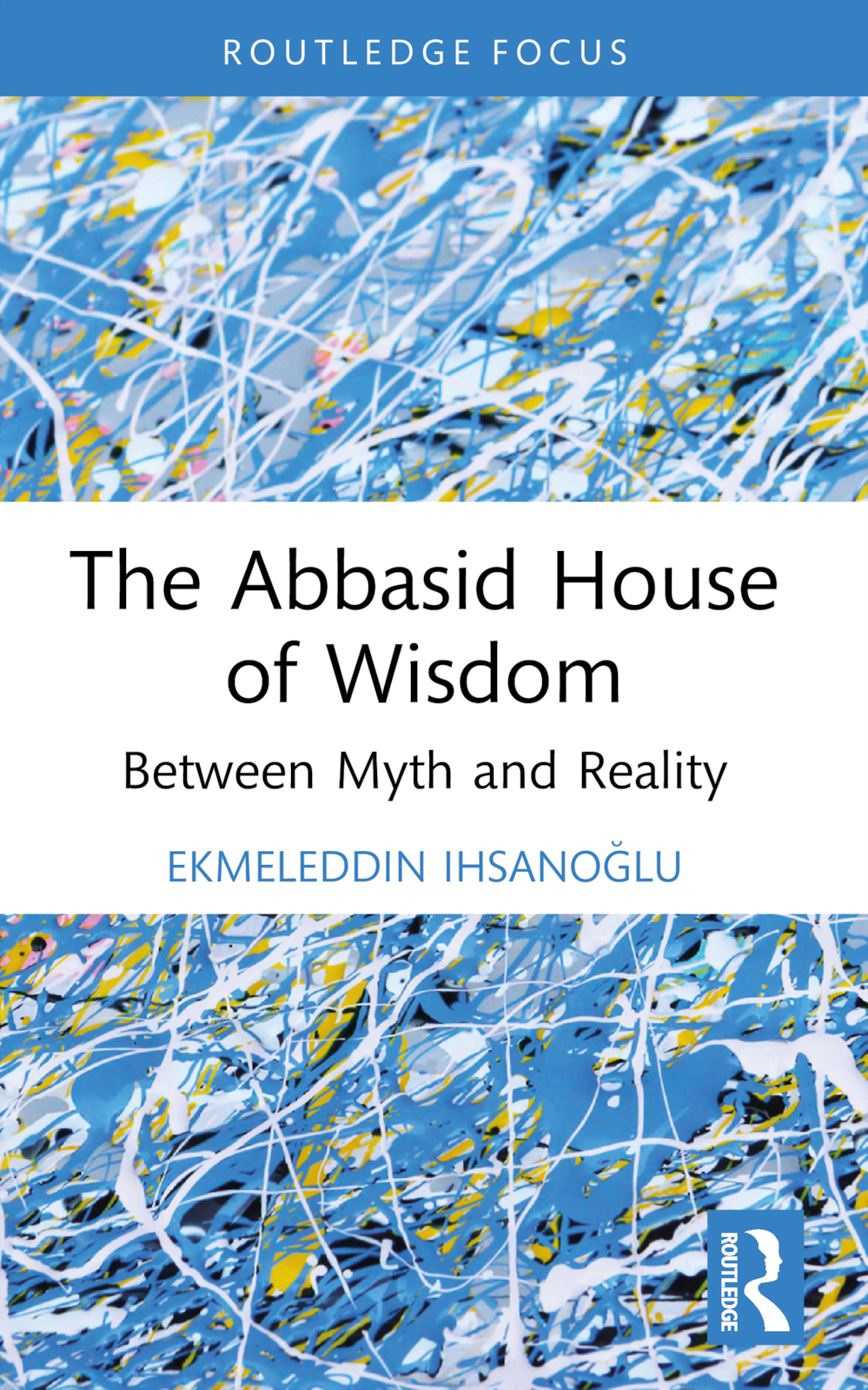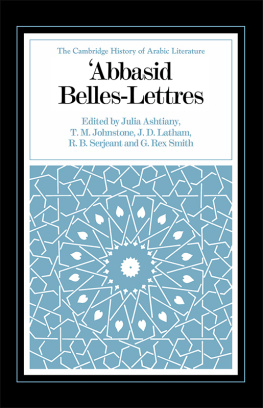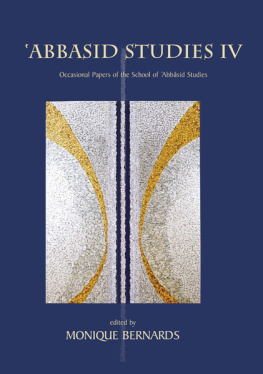Ekmeleddin Ihsanolu - The Abbasid House of Wisdom
Here you can read online Ekmeleddin Ihsanolu - The Abbasid House of Wisdom full text of the book (entire story) in english for free. Download pdf and epub, get meaning, cover and reviews about this ebook. year: 2022, publisher: TaylorFrancis, genre: Religion. Description of the work, (preface) as well as reviews are available. Best literature library LitArk.com created for fans of good reading and offers a wide selection of genres:
Romance novel
Science fiction
Adventure
Detective
Science
History
Home and family
Prose
Art
Politics
Computer
Non-fiction
Religion
Business
Children
Humor
Choose a favorite category and find really read worthwhile books. Enjoy immersion in the world of imagination, feel the emotions of the characters or learn something new for yourself, make an fascinating discovery.

- Book:The Abbasid House of Wisdom
- Author:
- Publisher:TaylorFrancis
- Genre:
- Year:2022
- Rating:4 / 5
- Favourites:Add to favourites
- Your mark:
- 80
- 1
- 2
- 3
- 4
- 5
The Abbasid House of Wisdom: summary, description and annotation
We offer to read an annotation, description, summary or preface (depends on what the author of the book "The Abbasid House of Wisdom" wrote himself). If you haven't found the necessary information about the book — write in the comments, we will try to find it.
The Abbasid House of Wisdom — read online for free the complete book (whole text) full work
Below is the text of the book, divided by pages. System saving the place of the last page read, allows you to conveniently read the book "The Abbasid House of Wisdom" online for free, without having to search again every time where you left off. Put a bookmark, and you can go to the page where you finished reading at any time.
Font size:
Interval:
Bookmark:

This volume examines the library of the Abbasid caliphs, known as The House of Wisdom (Bayt al-Hikma), exploring how this important institution has been misconceived by scholars.
This book places the palace library within the framework of the multifaceted cultural and scientific activities in the era of the caliphs, Harun al-Rashid and al-Mamun, generally regarded as the Golden Age of Islamic civilization. The author studies the first references to the House of Wisdom in European sources and shows how misconceptions arose because of incorrect translations of Arabic manuscripts and also because of how scholars overlooked the historical context of the library in ways that reflected their own cultural and national ambitions.
The Abbasid House of Wisdom is perfect for scholars, students, and the wider public interested in the scientific and cultural activities of the Islamic Golden Age.
Ekmeleddin Ihsanolu is a Turkish scholar and diplomat and a pioneer of studies of Ottoman Science and the history of institutions of learning. He was the founder and chair of the first Department of the History of Science in Turkey at the University of Istanbul, the IRCICA, the Turkish Society for the History of Science, and president of the International Union of History and Philosophy of Science from 2001 to 2005. He is editor and co-author of many volumes, including 18 volumes of History of Ottoman Science Literature, and laureate of Alexandre Koyr Medal.
First published 2023
by Routledge
4 Park Square, Milton Park, Abingdon, Oxon OX14 4RN
and by Routledge
605 Third Avenue, New York, NY 10158
Routledge is an imprint of the Taylor & Francis Group, an informa business
2023 Ekmeleddin Ihsanolu
The right of Ekmeleddin Ihsanolu to be identified as author of this work has been asserted in accordance with sections 77 and 78 of the Copyright, Designs and Patents Act 1988.
All rights reserved. No part of this book may be reprinted or reproduced or utilised in any form or by any electronic, mechanical, or other means, now known or hereafter invented, including photocopying and recording, or in any information storage or retrieval system, without permission in writing from the publishers.
Trademark notice: Product or corporate names may be trademarks or registered trademarks, and are used only for identification and explanation without intent to infringe.
British Library Cataloguing-in-Publication Data
A catalogue record for this book is available from the British Library
Library of Congress Cataloging-in-Publication Data
A catalog record has been requested for this book
ISBN: 978-1-032-34745-5 (hbk)
ISBN: 978-1-032-34748-6 (pbk)
ISBN: 978-1-003-32367-9 (ebk)
DOI: 10.4324/9781003323679
Typeset in Times New Roman
by codeMantra
The ninth-century Abbasid palace library known as the House of Wisdom has attracted the attention of generations of scholars from the end of the nineteenth century until today. The transformation of this institution from a palace library into a nineteenth-century modern European academy or fully-fledged modern-day university has had a very interesting journey.
In this book, we shall take up the few accounts in the classical Arabic sources and references in the biographies of the scholars associated with this library and evaluate how they were turned into a myth. Some innocent errors, the shifting of a words meaning during translation, the imagination of those dealing with the subject, and also emotional and nationalist aspirations paved the way for the birth of this myth.
The early studies conducted by pioneering orientalists reveal that the first examples of the confusion related to Bayt al-Hikma resulted from the problems of editing Arabic manuscripts or translating specific Arabic words and terms that had no standard equivalents in the European languages. At the turn of the twentieth century Bayt al-Hikma was transformed into an active institution of scientific pursuit including a library and observatory. As will be explained under , a PhD dissertation came to the conclusion that
the House of Wisdom appears to have been the university of Baghdad with its distinguished performance, library and observatory [it] may justly claim the honor of having been the first university of both the medieval and the modern world; for it bore the torch aloft long before Bologna, Paris, Prague, Oxford and Cambridge
At the turn of the twenty-first century, a new episode in the long history of the creation of this myth was a new claim that Bayt al-Hikma had roots that go deep in history; that is to say in the heritage of ancient Iraq from the days of the Sumerians, the Babylonians and the Assyrians.
In the last decades, an observed increase of interest among wide segments of western readership for the scientific achievements and accomplishments in the history of Muslim world, as well as the contributions of Muslim scholars and philosophers to the making of the Western civilization, has propelled popular publications addressed to a wide range of readership. These publications aimed to introduce the Abbasid House of Wisdom as a pivot behind the Golden Age of the Islamic civilization that epitomized the splendid glory of the past. However, these new publications were based on previous ones produced by generations of scholars where limited information in few primary sources regarding this palace library turned out, in the hands of Western and Muslim scholars, to be an endless source of inspiration which led to the creation of a myth of an Abbasid academy of sciences similar to European ones and a full-fledged modern university.
The main difficulty in comprehending the nature of the Abbasid palace library, at times referred to as Khizanat al-Hikma (Repository of Wisdom) and at others as Bayt al-Hikma (House of Wisdom), is how to situate this library within the overall framework of the multifaceted cultural and scientific activities in the era of the two caliphs Harun al-Rashid and al-Mamun, generally known as the golden age of the Islamic civilization. What is certain about these activities is that they were, in the main, held under caliphal patronage and their entourage. Indeed, the poets, the literary figures, religious scholars, physicians, astronomers, and astrologers who belonged to different religions and hailed from varied origins exercised their activities under the patronage of the caliph and with his financial support.
Careful and critical examination of the available information provided by the primary sources that have reached us has undoubtedly clarified many misunderstandings and helped to undo the fanciful portrait of the House of Wisdom. As for the claims that all these varied activities used to take place within the House of Wisdom and inside its specialized departments, we have clearly shown that this claim has no historical support.
There are certain specific figures as mentioned by the primary sources who were attached to the Palace library and who did work there officially. They, however few, are quite limited in number, but they stand as a proof to the existence of some mode of organized institutional work within the palace library that goes beyond the mere collection and preservation of books and encompasses other activities such as authoring, translating, and copying books.
Next pageFont size:
Interval:
Bookmark:
Similar books «The Abbasid House of Wisdom»
Look at similar books to The Abbasid House of Wisdom. We have selected literature similar in name and meaning in the hope of providing readers with more options to find new, interesting, not yet read works.
Discussion, reviews of the book The Abbasid House of Wisdom and just readers' own opinions. Leave your comments, write what you think about the work, its meaning or the main characters. Specify what exactly you liked and what you didn't like, and why you think so.









